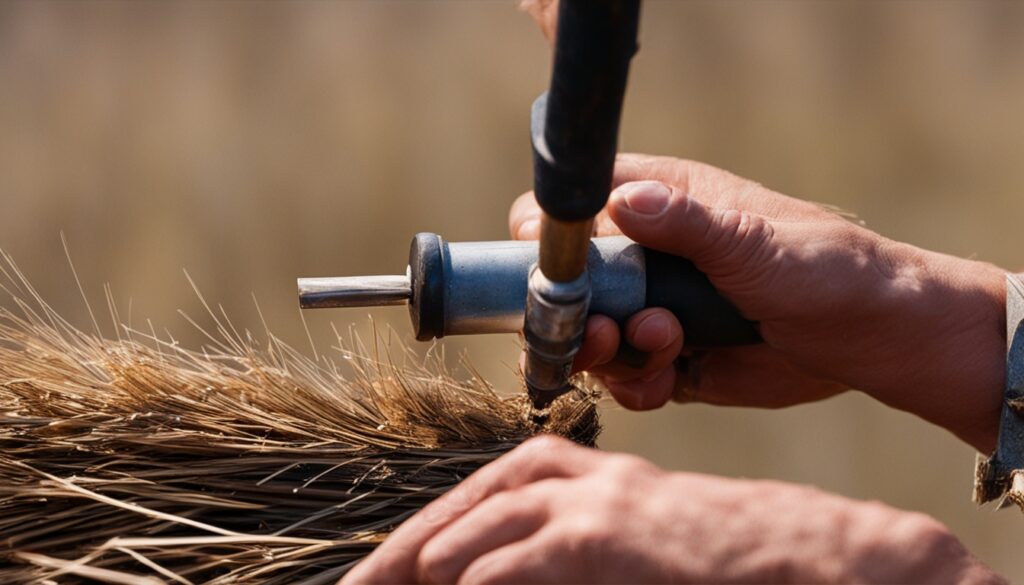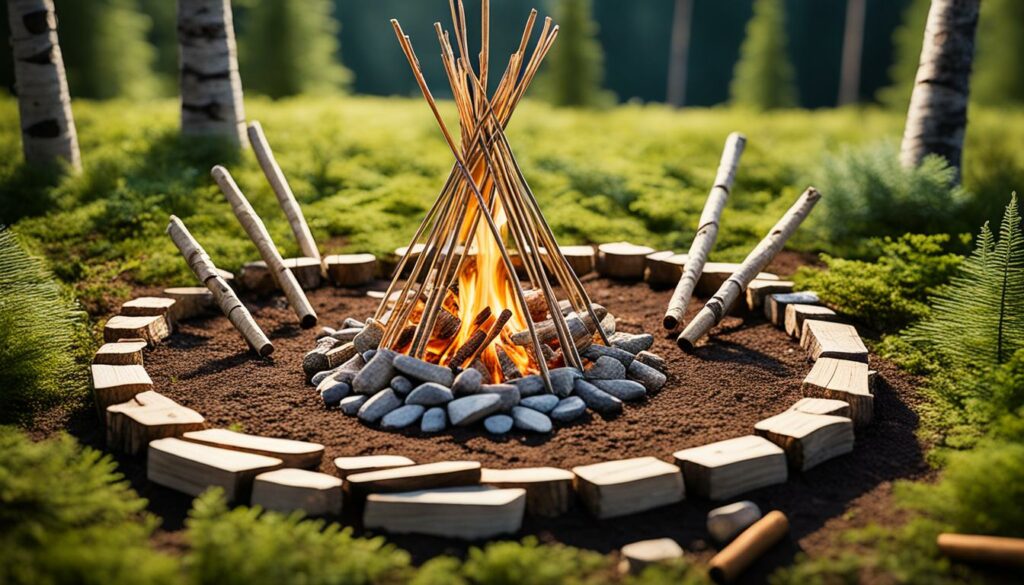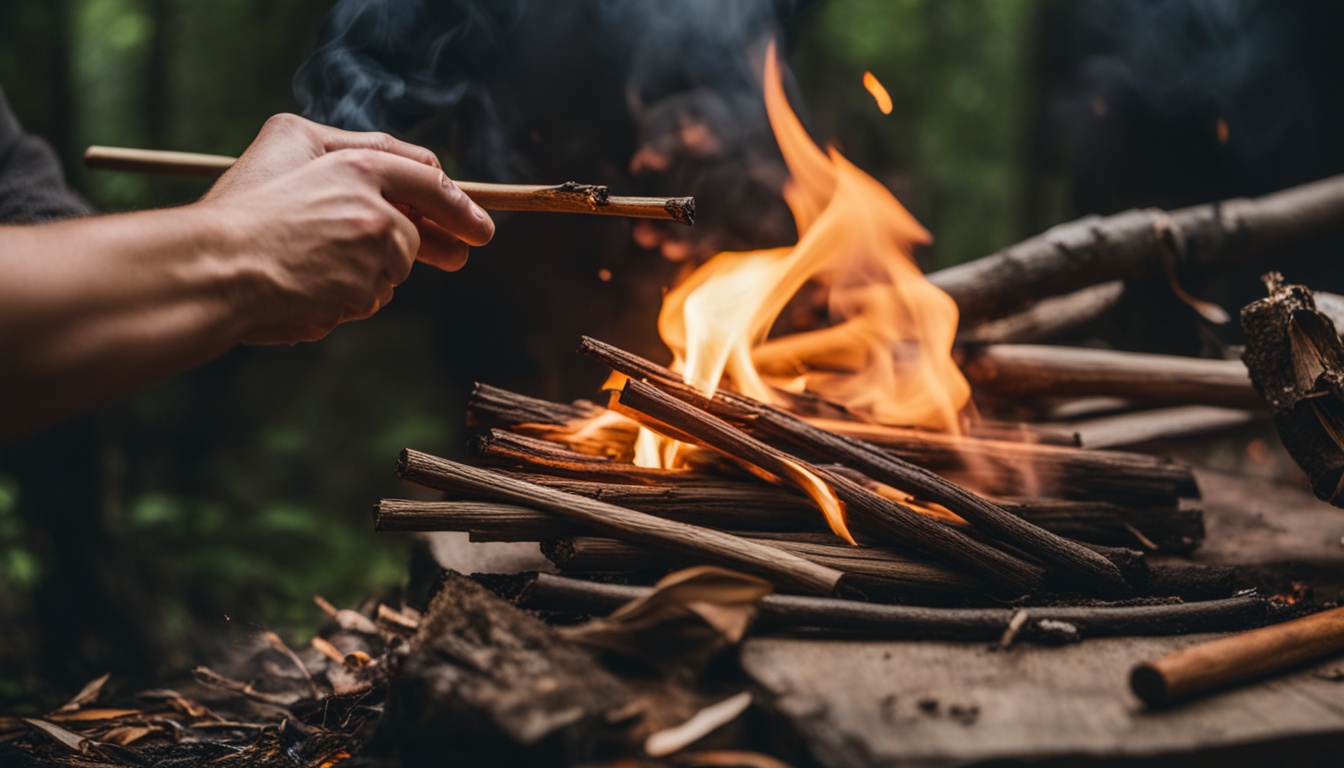Learning to make a hand drill fire starter is key for survival in the wild. This guide will show you how to start a fire with just a few items and some friction. It doesn’t matter if you’re new to bushcraft or a pro at starting fires the old way. You’ll be making fires in no time with this simple guide.
Key Takeaways
- Learn the essential materials and tools needed to make a hand drill fire starter
- Understand the different types of wood suitable for the spindle and fireboard
- Discover the proper techniques for preparing the spindle and fireboard
- Master the hand positioning and drilling process to generate heat and create a coal
- Explore the best tinder materials to ignite and build a successful fire
What Wood to Use for Hand Drill Fire Starter
Choosing the right wood is key for a hand drill fire starter. The fireboard should be made from a wood like cottonwood, willow, aspen, tamarack, cedar, sassafras, sycamore, or poplar. These woods are just right for the job.
Fireboard Woods
These woods are soft but strong. They let the spindle make enough heat to light the tinder. Make sure to use dead, very dry branches or wood. Green wood won’t work.
Spindle Woods
You can use the same woods for the spindle as for the fireboard. Or, try a harder wood like yucca. The spindle’s hardness helps make the fire start.
It’s important that all your wood is dry and seasoned. With the right woods, you’ll get good at making fires with a hand drill.
Preparing the Spindle
The hand drill spindle is key for your DIY fire starter. You need wood that’s about 3/4 inch thick, 8-12 inches long, and rounded nicely. Make one end taper down to a point, then make it a bit dull. The other end should be pointed but rounded, and also a bit dull.
Making the perfect spindle is key to using the hand drill fire starter well. Here are the steps:
- Pick a wood type for the hand drill spindle. Softwoods like cedar, pine, or basswood are good because they’re soft and easy to shape.
- Try to make the spindle diameter about 3/4 inch. This size is good for balance and speed.
- The spindle length should be 8-12 inches. This length helps you make enough speed and friction for a glowing ember.
- Use a knife or sandpaper to make one end sharp, then dull the tip a bit. This stops it from going too deep into the fireboard.
- Make the other end taper to a rounded point, and grind it down a bit. This makes it smooth for spinning.
With a great hand drill spindle, you’re ready to make your first fire with it. The quality of your spindle really affects how easy and efficient it is to make a fire.
Creating the Fireboard
Making a great hand drill fire starter starts with the fireboard. This piece of wood is key for success. It should be medium-hardness, about 1/2 to 3/4 inch thick, and wider than the spindle.
It should also be long enough for what you need. Choose very dry, dead wood for the hand drill fireboard. This makes it work better.
Carving the Fireboard Notch
Carve a shallow hole on one end of the fireboard for the spindle. This hole gets hot from friction. Also, make a triangular notch leading to the hole.
This notch helps make the coal for the fire. Put bark or thin wood under it to catch the tinder.
The notch’s depth and width are very important. Getting them right helps make a good fire. It makes sure the heat moves well and creates a glowing ember.
“The secret to a successful hand drill fire starter lies in the careful preparation of the fireboard.”
By making the fireboard and notch well, you’re ready for a great fire-making experience. With the right skills and care, you’re all set for the next steps in starting a fire with a hand drill.
How to make a hand drill fire starter
Learning to make a hand drill fire starter is key for outdoor lovers. This old method makes fire by spinning a spindle against a fireboard. It’s a fun and rewarding way to start fires. Here’s how to make your own hand drill fire starter.
- Put your left foot on the left side of the notch in the fireboard. Your right knee should be behind it. This stance helps you stay stable and in control.
- Put the spindle in the notch, with the rounded end down. Twist it clockwise in the bowstring and pull it up a bit.
- Hold the handhold on top of the spindle with your left hand. Rest your wrist on your left shin. This keeps your motion steady.
- Use your right hand to work the bow. Start slow, then speed up and press down harder on the spindle. Finding the right rhythm and pressure is key to starting a fire with a hand drill.
- Keep drilling until you see smoke from the notch. Keep going until your arm hurts. Persistence is often what makes the ember light.
Getting good at the drilling technique and knowing how to spin the spindle is crucial. With practice and patience, you’ll make glowing embers easily. This will improve your outdoor fire-making skills a lot.

“The ability to start a fire with a hand drill is a true testament to human ingenuity and resilience. It’s a skill that connects us to our ancestors and the natural world in a profound way.”
The Tinder Bundle
The tinder bundle is key for starting a fire with a hand drill. It’s made of dry, flammable materials that help turn a coal into a flame. You need to pick tinder that catches sparks easily and lights up fast.
Tinder Materials
Here are some top tinder materials for starting a fire:
- Cliffrose outer bark
- Cottonwood inner cambium
- Sagebrush outer bark
- Juniper outer bark
- Yucca fibers
- Nettle fibers
- Milkweed fibers
- Dogbane fibers
- Thistle down
- Cattail down
- Partially decomposed grass blades
Make these tinder materials into a loose, nest-like bundle. This makes it easy for the coal to catch and start a flame. Dry and flammable tinder is best for starting a fire with a hand drill.
“The tinder bundle is the spark to your fire – choose wisely and prepare it with care.”
Setting Up the Fire Lay
After making a coal with the hand drill, it’s time to set up the fire lay. The teepee fire lay is great because it lets air in and gives the flame room to grow.
To make a teepee fire lay, start by putting thin, dry kindling sticks upright in a cone shape. This shape helps air move well and is perfect for starting the fire. As the fire gets bigger, add bigger fuel wood pieces, arranging them so the coal can grow into a strong fire.
Getting the fire lay right is key to making the fire work well. By building the fire structure carefully, you help your hand drill fire last longer and burn better.

“The key to a successful fire lies in the careful arrangement of its components. A well-constructed fire lay can make all the difference in transforming a spark into a warm, steady flame.”
| Fire Lay Type | Description | Advantages |
|---|---|---|
| Teepee Fire Lay | Upright kindling sticks arranged in a cone shape |
|
| Log Cabin Fire Lay | Criss-crossed layers of fuel wood |
|
| Star Fire Lay | Kindling arranged in a radial pattern |
|
Spinning the Hand Drill
Learning how to use a hand drill is key to making a campfire coal. You need to get your hand position right and keep the drill moving smoothly. This takes practice and focus.
Hand Positioning
Hold the spindle with the meaty parts of your palms, and stretch out your fingers. This grip helps you keep downward pressure steady while you spin the spindle.
Drilling Technique
Begin with a slow, smooth drilling motion. Then, speed up and press harder as you go. Keep your back straight and your arm straight for the best control. Drill until you see smoke and the notch is full of dark dust. This means you’ve made a coal.
Having the right hand positioning and drilling motion is key to making a fire starter work. With time and effort, you’ll get the hang of it. Then, you can start fires with just your hands.
Conclusion
Learning how to make a fire with a hand drill is a great skill for outdoor adventures and emergencies. This guide will help you make a hand drill fire starter. It’s a key part of bushcraft knowledge.
Being able to start a fire without matches or lighters is crucial outdoors. The hand drill method is a fun challenge that improves your survival skills. With practice and patience, you’ll get better at making fires with a hand drill. This skill is great for outdoor preparedness and bushcraft.
The journey to master the hand drill fire starter is just as important as reaching the goal. Enjoy the challenge and be proud of your new fire starting techniques and survival skill. With hard work and determination, you can become a true outdoor expert and master of the hand drill fire starter.
FAQ
What type of wood is best for the fireboard and spindle in a hand drill fire starter?
What are the ideal dimensions for the hand drill spindle?
How should the fireboard be prepared for the hand drill fire starter?
What is the proper hand positioning and drilling technique for using a hand drill?
What materials make the best tinder bundle for a hand drill fire starter?
How should the fire lay be set up to transition the hand drill-created coal into a sustainable flame?
Source Links
- Survival Skills: How to Make Fire With a Hand Drill – https://www.outdoorlife.com/blogs/survivalist/2012/02/survival-skills-how-build-hand-drill-fire/
- Primitive Fire Starting: the Bow Drill – https://www.instructables.com/Fire-without-matches-or-metal/
- How to start a fire with the hand drill method Forest Info – https://forestinfo.org/hand-drill-fire/
